Nursing Project: Critical Analysis of Bipolar Disorder Interventions
VerifiedAdded on 2023/01/11
|10
|2773
|23
Report
AI Summary
This nursing project report provides an in-depth analysis of bipolar disorder, examining its characteristics, symptoms, and the impact on individuals. The report delves into the critical analysis of current literature, focusing on various interventions such as family-focused therapy, interpersonal and social rhythm therapy, cognitive-behavioral therapy, and psychoeducation. It highlights the importance of evidence-based practices in mental health settings and discusses the implications of these interventions for nursing practice. The report emphasizes the need for healthcare practitioners to continuously develop their skills and adapt to the changing needs of patients. Furthermore, it underscores the significance of family involvement and support in the recovery process of individuals with bipolar disorder, providing insights into how these interventions can be effectively implemented to improve patient outcomes. The report concludes by reinforcing the importance of psychological treatments and the integration of family and friends in patient care.
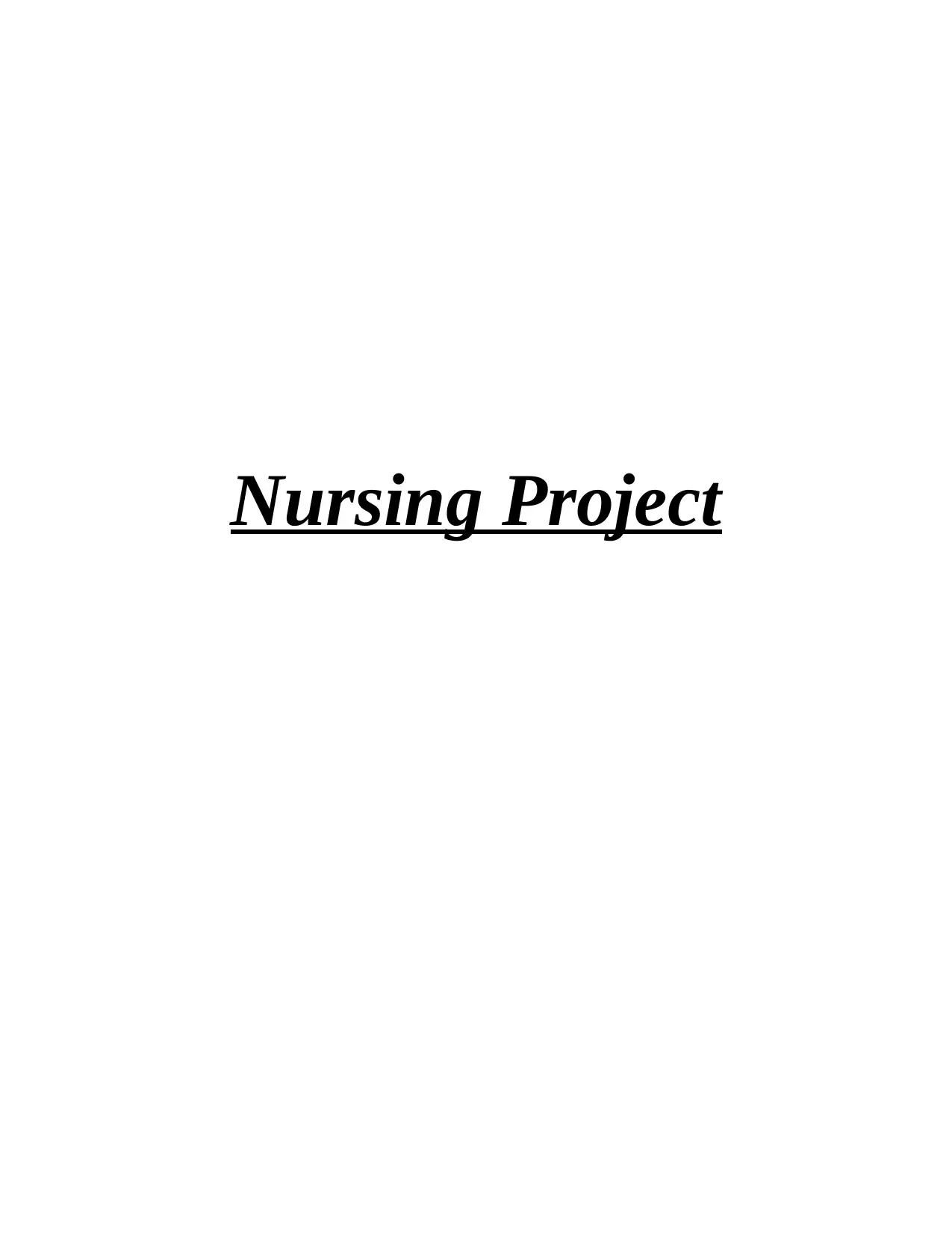
Nursing Project
Paraphrase This Document
Need a fresh take? Get an instant paraphrase of this document with our AI Paraphraser
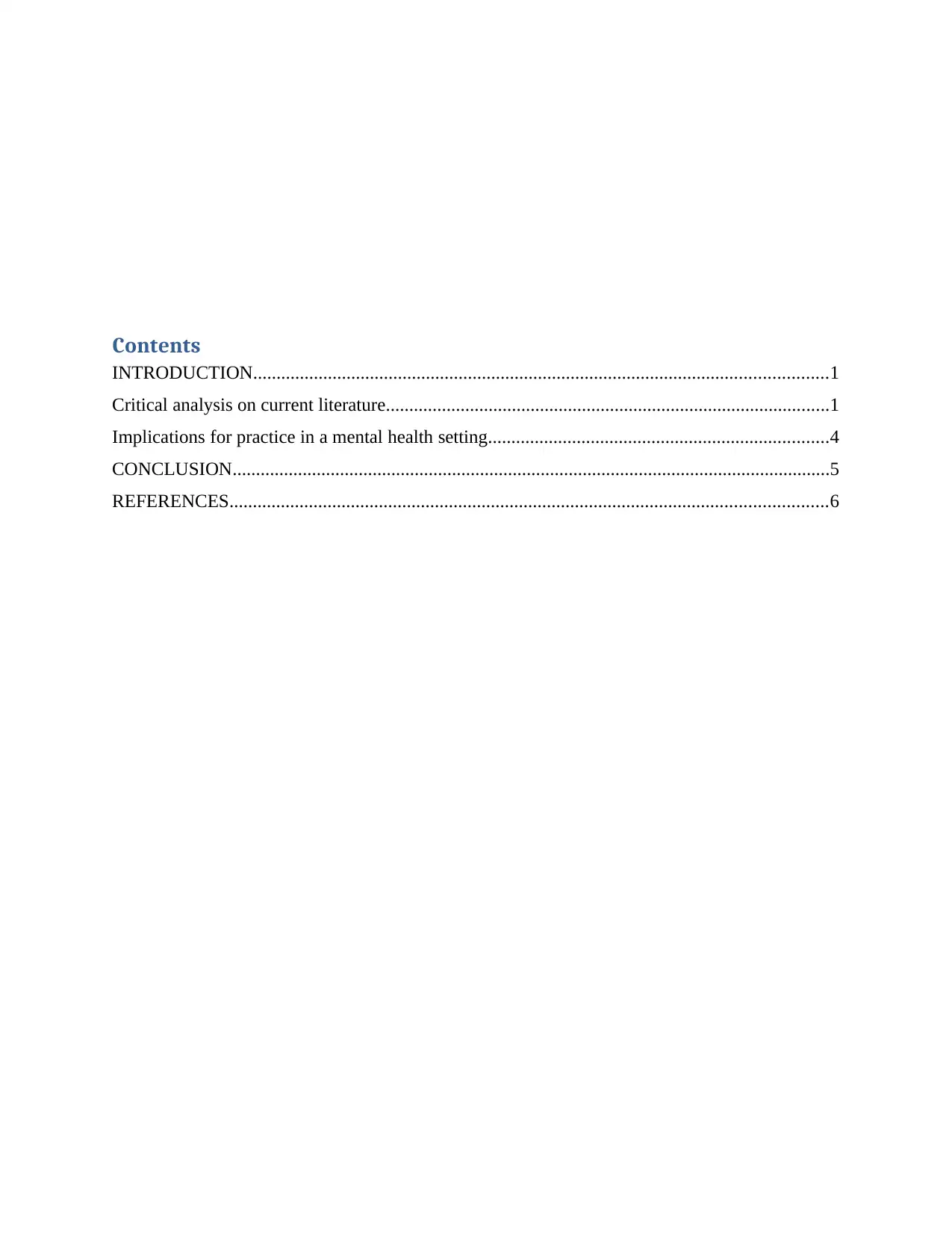
Contents
INTRODUCTION...........................................................................................................................1
Critical analysis on current literature...............................................................................................1
Implications for practice in a mental health setting.........................................................................4
CONCLUSION................................................................................................................................5
REFERENCES................................................................................................................................6
INTRODUCTION...........................................................................................................................1
Critical analysis on current literature...............................................................................................1
Implications for practice in a mental health setting.........................................................................4
CONCLUSION................................................................................................................................5
REFERENCES................................................................................................................................6

⊘ This is a preview!⊘
Do you want full access?
Subscribe today to unlock all pages.

Trusted by 1+ million students worldwide
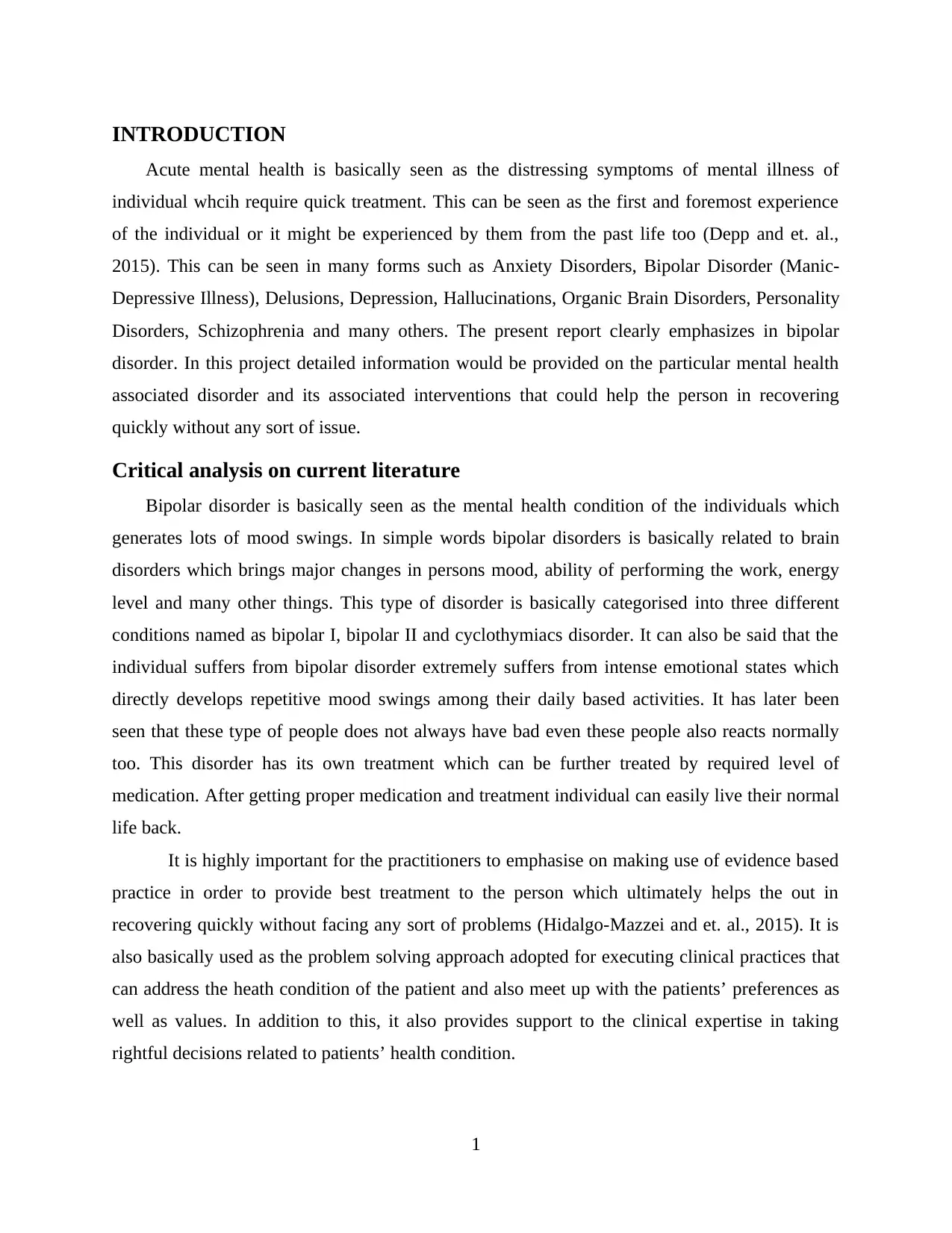
INTRODUCTION
Acute mental health is basically seen as the distressing symptoms of mental illness of
individual whcih require quick treatment. This can be seen as the first and foremost experience
of the individual or it might be experienced by them from the past life too (Depp and et. al.,
2015). This can be seen in many forms such as Anxiety Disorders, Bipolar Disorder (Manic-
Depressive Illness), Delusions, Depression, Hallucinations, Organic Brain Disorders, Personality
Disorders, Schizophrenia and many others. The present report clearly emphasizes in bipolar
disorder. In this project detailed information would be provided on the particular mental health
associated disorder and its associated interventions that could help the person in recovering
quickly without any sort of issue.
Critical analysis on current literature
Bipolar disorder is basically seen as the mental health condition of the individuals which
generates lots of mood swings. In simple words bipolar disorders is basically related to brain
disorders which brings major changes in persons mood, ability of performing the work, energy
level and many other things. This type of disorder is basically categorised into three different
conditions named as bipolar I, bipolar II and cyclothymiacs disorder. It can also be said that the
individual suffers from bipolar disorder extremely suffers from intense emotional states which
directly develops repetitive mood swings among their daily based activities. It has later been
seen that these type of people does not always have bad even these people also reacts normally
too. This disorder has its own treatment which can be further treated by required level of
medication. After getting proper medication and treatment individual can easily live their normal
life back.
It is highly important for the practitioners to emphasise on making use of evidence based
practice in order to provide best treatment to the person which ultimately helps the out in
recovering quickly without facing any sort of problems (Hidalgo-Mazzei and et. al., 2015). It is
also basically used as the problem solving approach adopted for executing clinical practices that
can address the heath condition of the patient and also meet up with the patients’ preferences as
well as values. In addition to this, it also provides support to the clinical expertise in taking
rightful decisions related to patients’ health condition.
1
Acute mental health is basically seen as the distressing symptoms of mental illness of
individual whcih require quick treatment. This can be seen as the first and foremost experience
of the individual or it might be experienced by them from the past life too (Depp and et. al.,
2015). This can be seen in many forms such as Anxiety Disorders, Bipolar Disorder (Manic-
Depressive Illness), Delusions, Depression, Hallucinations, Organic Brain Disorders, Personality
Disorders, Schizophrenia and many others. The present report clearly emphasizes in bipolar
disorder. In this project detailed information would be provided on the particular mental health
associated disorder and its associated interventions that could help the person in recovering
quickly without any sort of issue.
Critical analysis on current literature
Bipolar disorder is basically seen as the mental health condition of the individuals which
generates lots of mood swings. In simple words bipolar disorders is basically related to brain
disorders which brings major changes in persons mood, ability of performing the work, energy
level and many other things. This type of disorder is basically categorised into three different
conditions named as bipolar I, bipolar II and cyclothymiacs disorder. It can also be said that the
individual suffers from bipolar disorder extremely suffers from intense emotional states which
directly develops repetitive mood swings among their daily based activities. It has later been
seen that these type of people does not always have bad even these people also reacts normally
too. This disorder has its own treatment which can be further treated by required level of
medication. After getting proper medication and treatment individual can easily live their normal
life back.
It is highly important for the practitioners to emphasise on making use of evidence based
practice in order to provide best treatment to the person which ultimately helps the out in
recovering quickly without facing any sort of problems (Hidalgo-Mazzei and et. al., 2015). It is
also basically used as the problem solving approach adopted for executing clinical practices that
can address the heath condition of the patient and also meet up with the patients’ preferences as
well as values. In addition to this, it also provides support to the clinical expertise in taking
rightful decisions related to patients’ health condition.
1
Paraphrase This Document
Need a fresh take? Get an instant paraphrase of this document with our AI Paraphraser
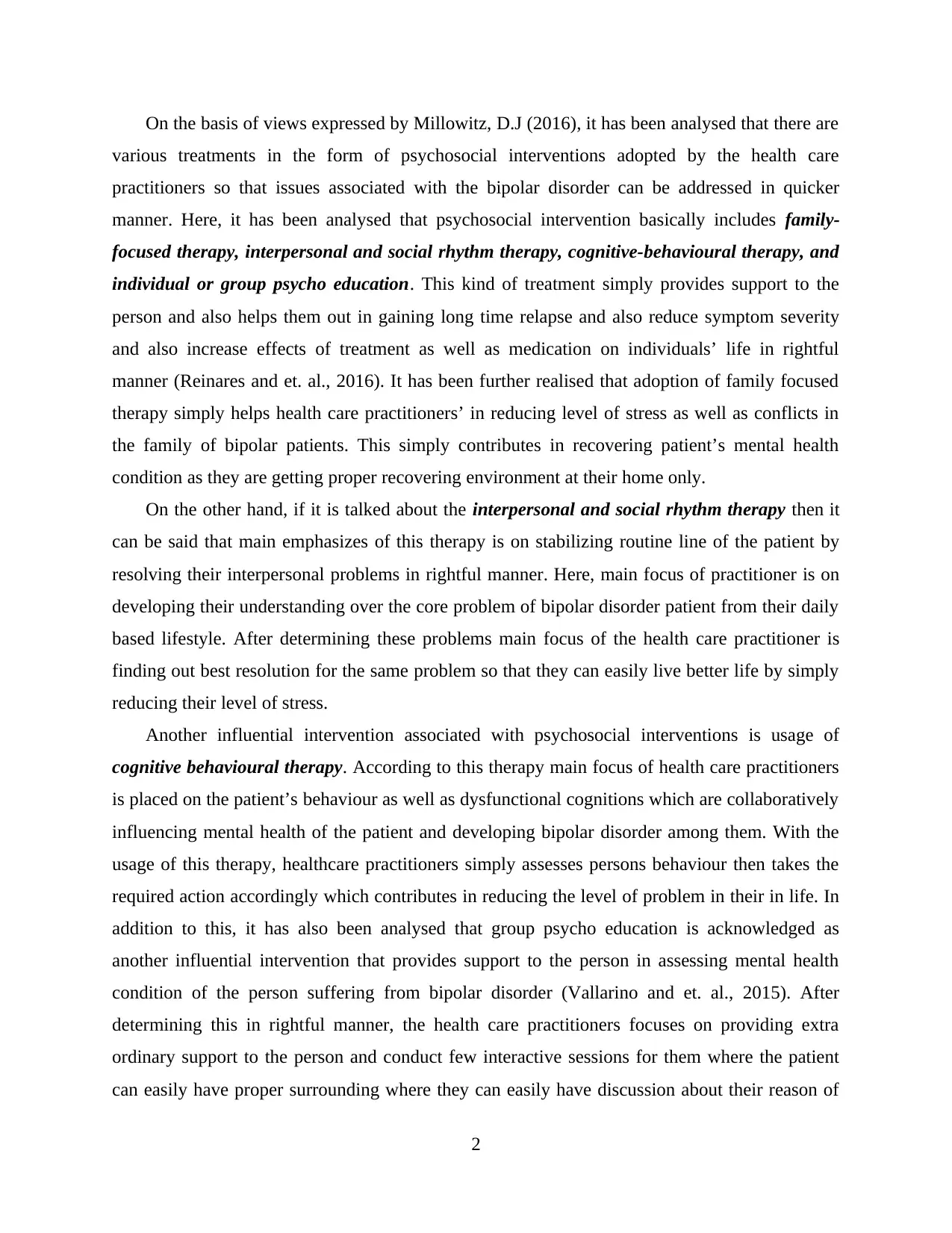
On the basis of views expressed by Millowitz, D.J (2016), it has been analysed that there are
various treatments in the form of psychosocial interventions adopted by the health care
practitioners so that issues associated with the bipolar disorder can be addressed in quicker
manner. Here, it has been analysed that psychosocial intervention basically includes family-
focused therapy, interpersonal and social rhythm therapy, cognitive-behavioural therapy, and
individual or group psycho education. This kind of treatment simply provides support to the
person and also helps them out in gaining long time relapse and also reduce symptom severity
and also increase effects of treatment as well as medication on individuals’ life in rightful
manner (Reinares and et. al., 2016). It has been further realised that adoption of family focused
therapy simply helps health care practitioners’ in reducing level of stress as well as conflicts in
the family of bipolar patients. This simply contributes in recovering patient’s mental health
condition as they are getting proper recovering environment at their home only.
On the other hand, if it is talked about the interpersonal and social rhythm therapy then it
can be said that main emphasizes of this therapy is on stabilizing routine line of the patient by
resolving their interpersonal problems in rightful manner. Here, main focus of practitioner is on
developing their understanding over the core problem of bipolar disorder patient from their daily
based lifestyle. After determining these problems main focus of the health care practitioner is
finding out best resolution for the same problem so that they can easily live better life by simply
reducing their level of stress.
Another influential intervention associated with psychosocial interventions is usage of
cognitive behavioural therapy. According to this therapy main focus of health care practitioners
is placed on the patient’s behaviour as well as dysfunctional cognitions which are collaboratively
influencing mental health of the patient and developing bipolar disorder among them. With the
usage of this therapy, healthcare practitioners simply assesses persons behaviour then takes the
required action accordingly which contributes in reducing the level of problem in their in life. In
addition to this, it has also been analysed that group psycho education is acknowledged as
another influential intervention that provides support to the person in assessing mental health
condition of the person suffering from bipolar disorder (Vallarino and et. al., 2015). After
determining this in rightful manner, the health care practitioners focuses on providing extra
ordinary support to the person and conduct few interactive sessions for them where the patient
can easily have proper surrounding where they can easily have discussion about their reason of
2
various treatments in the form of psychosocial interventions adopted by the health care
practitioners so that issues associated with the bipolar disorder can be addressed in quicker
manner. Here, it has been analysed that psychosocial intervention basically includes family-
focused therapy, interpersonal and social rhythm therapy, cognitive-behavioural therapy, and
individual or group psycho education. This kind of treatment simply provides support to the
person and also helps them out in gaining long time relapse and also reduce symptom severity
and also increase effects of treatment as well as medication on individuals’ life in rightful
manner (Reinares and et. al., 2016). It has been further realised that adoption of family focused
therapy simply helps health care practitioners’ in reducing level of stress as well as conflicts in
the family of bipolar patients. This simply contributes in recovering patient’s mental health
condition as they are getting proper recovering environment at their home only.
On the other hand, if it is talked about the interpersonal and social rhythm therapy then it
can be said that main emphasizes of this therapy is on stabilizing routine line of the patient by
resolving their interpersonal problems in rightful manner. Here, main focus of practitioner is on
developing their understanding over the core problem of bipolar disorder patient from their daily
based lifestyle. After determining these problems main focus of the health care practitioner is
finding out best resolution for the same problem so that they can easily live better life by simply
reducing their level of stress.
Another influential intervention associated with psychosocial interventions is usage of
cognitive behavioural therapy. According to this therapy main focus of health care practitioners
is placed on the patient’s behaviour as well as dysfunctional cognitions which are collaboratively
influencing mental health of the patient and developing bipolar disorder among them. With the
usage of this therapy, healthcare practitioners simply assesses persons behaviour then takes the
required action accordingly which contributes in reducing the level of problem in their in life. In
addition to this, it has also been analysed that group psycho education is acknowledged as
another influential intervention that provides support to the person in assessing mental health
condition of the person suffering from bipolar disorder (Vallarino and et. al., 2015). After
determining this in rightful manner, the health care practitioners focuses on providing extra
ordinary support to the person and conduct few interactive sessions for them where the patient
can easily have proper surrounding where they can easily have discussion about their reason of
2
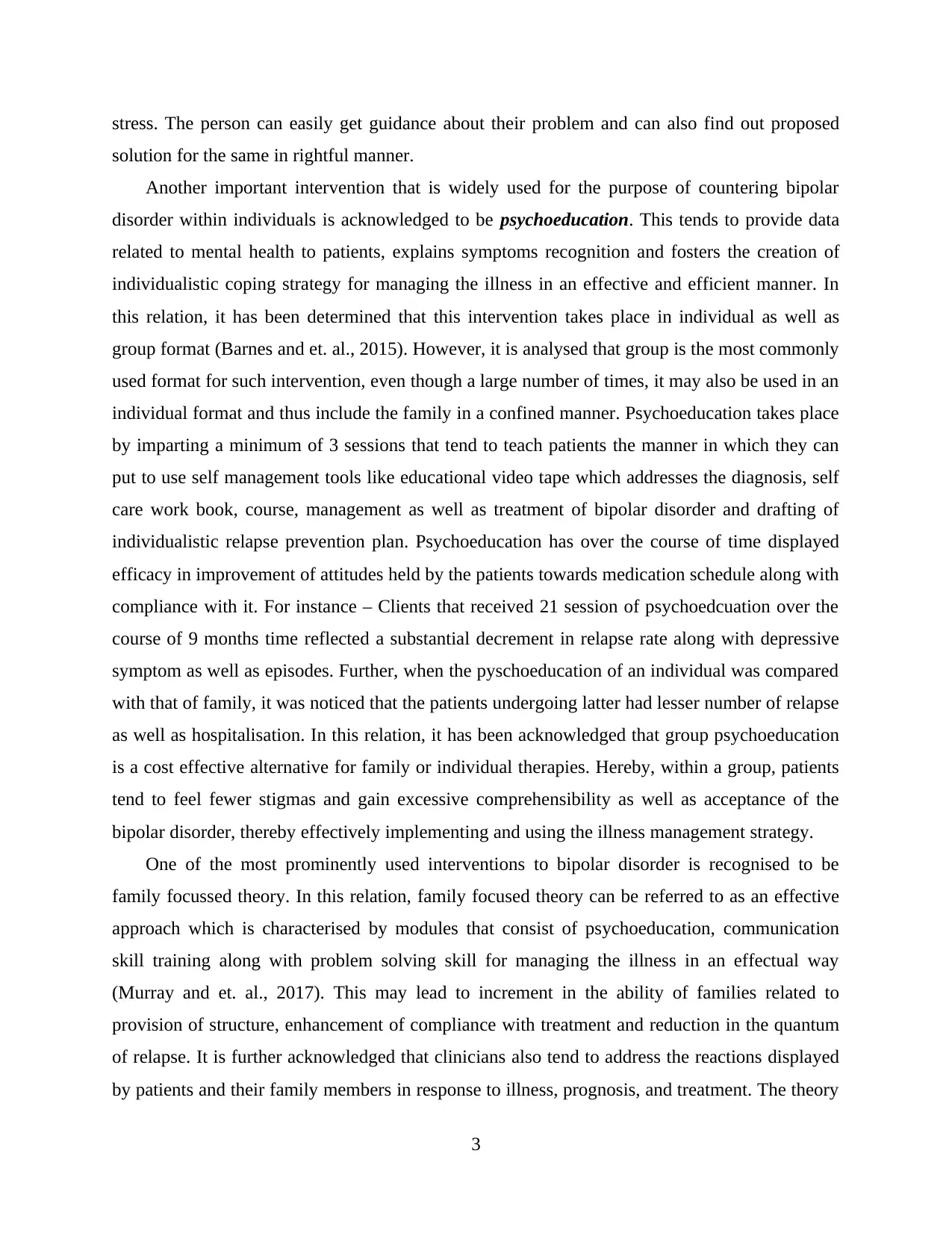
stress. The person can easily get guidance about their problem and can also find out proposed
solution for the same in rightful manner.
Another important intervention that is widely used for the purpose of countering bipolar
disorder within individuals is acknowledged to be psychoeducation. This tends to provide data
related to mental health to patients, explains symptoms recognition and fosters the creation of
individualistic coping strategy for managing the illness in an effective and efficient manner. In
this relation, it has been determined that this intervention takes place in individual as well as
group format (Barnes and et. al., 2015). However, it is analysed that group is the most commonly
used format for such intervention, even though a large number of times, it may also be used in an
individual format and thus include the family in a confined manner. Psychoeducation takes place
by imparting a minimum of 3 sessions that tend to teach patients the manner in which they can
put to use self management tools like educational video tape which addresses the diagnosis, self
care work book, course, management as well as treatment of bipolar disorder and drafting of
individualistic relapse prevention plan. Psychoeducation has over the course of time displayed
efficacy in improvement of attitudes held by the patients towards medication schedule along with
compliance with it. For instance – Clients that received 21 session of psychoedcuation over the
course of 9 months time reflected a substantial decrement in relapse rate along with depressive
symptom as well as episodes. Further, when the pyschoeducation of an individual was compared
with that of family, it was noticed that the patients undergoing latter had lesser number of relapse
as well as hospitalisation. In this relation, it has been acknowledged that group psychoeducation
is a cost effective alternative for family or individual therapies. Hereby, within a group, patients
tend to feel fewer stigmas and gain excessive comprehensibility as well as acceptance of the
bipolar disorder, thereby effectively implementing and using the illness management strategy.
One of the most prominently used interventions to bipolar disorder is recognised to be
family focussed theory. In this relation, family focused theory can be referred to as an effective
approach which is characterised by modules that consist of psychoeducation, communication
skill training along with problem solving skill for managing the illness in an effectual way
(Murray and et. al., 2017). This may lead to increment in the ability of families related to
provision of structure, enhancement of compliance with treatment and reduction in the quantum
of relapse. It is further acknowledged that clinicians also tend to address the reactions displayed
by patients and their family members in response to illness, prognosis, and treatment. The theory
3
solution for the same in rightful manner.
Another important intervention that is widely used for the purpose of countering bipolar
disorder within individuals is acknowledged to be psychoeducation. This tends to provide data
related to mental health to patients, explains symptoms recognition and fosters the creation of
individualistic coping strategy for managing the illness in an effective and efficient manner. In
this relation, it has been determined that this intervention takes place in individual as well as
group format (Barnes and et. al., 2015). However, it is analysed that group is the most commonly
used format for such intervention, even though a large number of times, it may also be used in an
individual format and thus include the family in a confined manner. Psychoeducation takes place
by imparting a minimum of 3 sessions that tend to teach patients the manner in which they can
put to use self management tools like educational video tape which addresses the diagnosis, self
care work book, course, management as well as treatment of bipolar disorder and drafting of
individualistic relapse prevention plan. Psychoeducation has over the course of time displayed
efficacy in improvement of attitudes held by the patients towards medication schedule along with
compliance with it. For instance – Clients that received 21 session of psychoedcuation over the
course of 9 months time reflected a substantial decrement in relapse rate along with depressive
symptom as well as episodes. Further, when the pyschoeducation of an individual was compared
with that of family, it was noticed that the patients undergoing latter had lesser number of relapse
as well as hospitalisation. In this relation, it has been acknowledged that group psychoeducation
is a cost effective alternative for family or individual therapies. Hereby, within a group, patients
tend to feel fewer stigmas and gain excessive comprehensibility as well as acceptance of the
bipolar disorder, thereby effectively implementing and using the illness management strategy.
One of the most prominently used interventions to bipolar disorder is recognised to be
family focussed theory. In this relation, family focused theory can be referred to as an effective
approach which is characterised by modules that consist of psychoeducation, communication
skill training along with problem solving skill for managing the illness in an effectual way
(Murray and et. al., 2017). This may lead to increment in the ability of families related to
provision of structure, enhancement of compliance with treatment and reduction in the quantum
of relapse. It is further acknowledged that clinicians also tend to address the reactions displayed
by patients and their family members in response to illness, prognosis, and treatment. The theory
3
⊘ This is a preview!⊘
Do you want full access?
Subscribe today to unlock all pages.

Trusted by 1+ million students worldwide
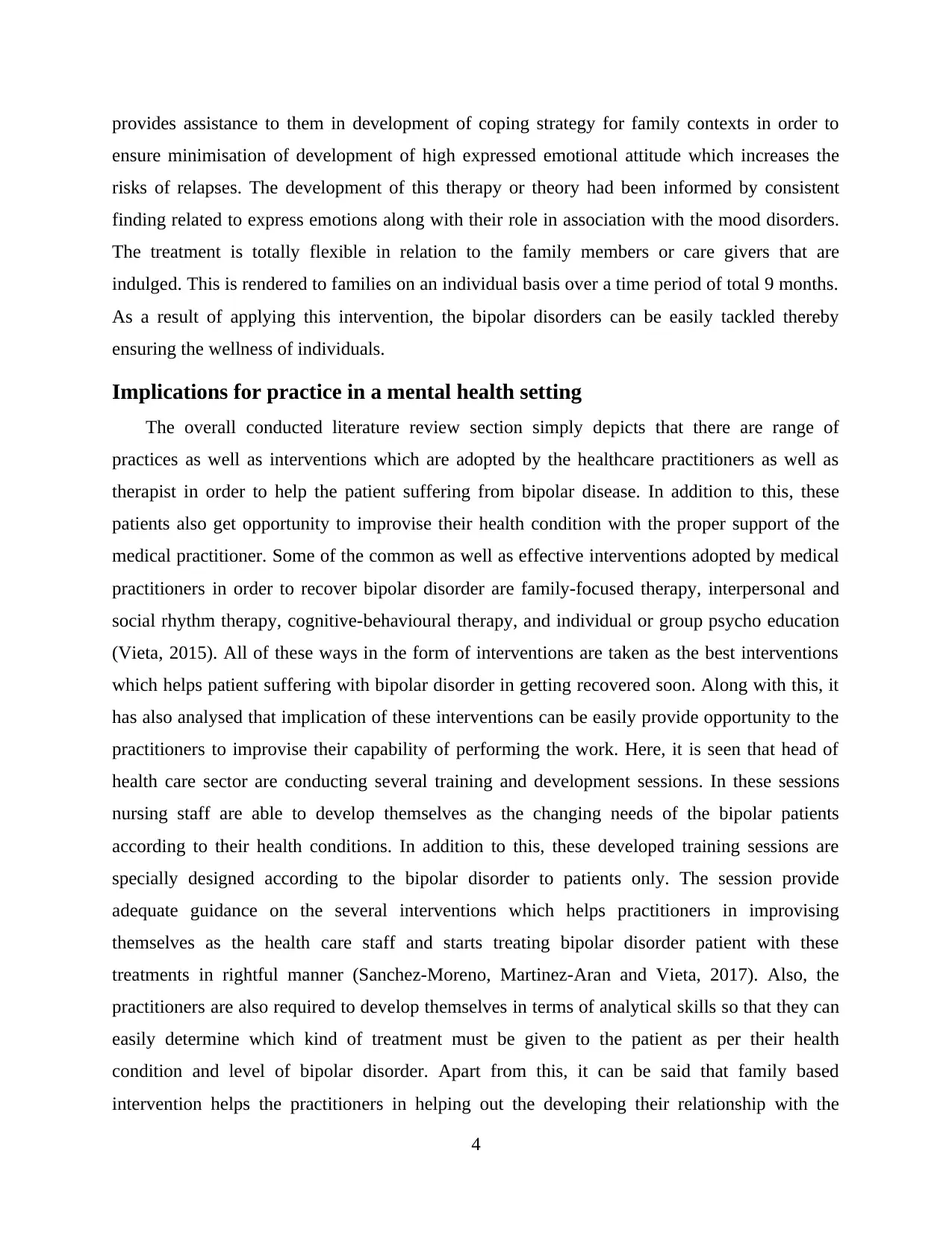
provides assistance to them in development of coping strategy for family contexts in order to
ensure minimisation of development of high expressed emotional attitude which increases the
risks of relapses. The development of this therapy or theory had been informed by consistent
finding related to express emotions along with their role in association with the mood disorders.
The treatment is totally flexible in relation to the family members or care givers that are
indulged. This is rendered to families on an individual basis over a time period of total 9 months.
As a result of applying this intervention, the bipolar disorders can be easily tackled thereby
ensuring the wellness of individuals.
Implications for practice in a mental health setting
The overall conducted literature review section simply depicts that there are range of
practices as well as interventions which are adopted by the healthcare practitioners as well as
therapist in order to help the patient suffering from bipolar disease. In addition to this, these
patients also get opportunity to improvise their health condition with the proper support of the
medical practitioner. Some of the common as well as effective interventions adopted by medical
practitioners in order to recover bipolar disorder are family-focused therapy, interpersonal and
social rhythm therapy, cognitive-behavioural therapy, and individual or group psycho education
(Vieta, 2015). All of these ways in the form of interventions are taken as the best interventions
which helps patient suffering with bipolar disorder in getting recovered soon. Along with this, it
has also analysed that implication of these interventions can be easily provide opportunity to the
practitioners to improvise their capability of performing the work. Here, it is seen that head of
health care sector are conducting several training and development sessions. In these sessions
nursing staff are able to develop themselves as the changing needs of the bipolar patients
according to their health conditions. In addition to this, these developed training sessions are
specially designed according to the bipolar disorder to patients only. The session provide
adequate guidance on the several interventions which helps practitioners in improvising
themselves as the health care staff and starts treating bipolar disorder patient with these
treatments in rightful manner (Sanchez-Moreno, Martinez-Aran and Vieta, 2017). Also, the
practitioners are also required to develop themselves in terms of analytical skills so that they can
easily determine which kind of treatment must be given to the patient as per their health
condition and level of bipolar disorder. Apart from this, it can be said that family based
intervention helps the practitioners in helping out the developing their relationship with the
4
ensure minimisation of development of high expressed emotional attitude which increases the
risks of relapses. The development of this therapy or theory had been informed by consistent
finding related to express emotions along with their role in association with the mood disorders.
The treatment is totally flexible in relation to the family members or care givers that are
indulged. This is rendered to families on an individual basis over a time period of total 9 months.
As a result of applying this intervention, the bipolar disorders can be easily tackled thereby
ensuring the wellness of individuals.
Implications for practice in a mental health setting
The overall conducted literature review section simply depicts that there are range of
practices as well as interventions which are adopted by the healthcare practitioners as well as
therapist in order to help the patient suffering from bipolar disease. In addition to this, these
patients also get opportunity to improvise their health condition with the proper support of the
medical practitioner. Some of the common as well as effective interventions adopted by medical
practitioners in order to recover bipolar disorder are family-focused therapy, interpersonal and
social rhythm therapy, cognitive-behavioural therapy, and individual or group psycho education
(Vieta, 2015). All of these ways in the form of interventions are taken as the best interventions
which helps patient suffering with bipolar disorder in getting recovered soon. Along with this, it
has also analysed that implication of these interventions can be easily provide opportunity to the
practitioners to improvise their capability of performing the work. Here, it is seen that head of
health care sector are conducting several training and development sessions. In these sessions
nursing staff are able to develop themselves as the changing needs of the bipolar patients
according to their health conditions. In addition to this, these developed training sessions are
specially designed according to the bipolar disorder to patients only. The session provide
adequate guidance on the several interventions which helps practitioners in improvising
themselves as the health care staff and starts treating bipolar disorder patient with these
treatments in rightful manner (Sanchez-Moreno, Martinez-Aran and Vieta, 2017). Also, the
practitioners are also required to develop themselves in terms of analytical skills so that they can
easily determine which kind of treatment must be given to the patient as per their health
condition and level of bipolar disorder. Apart from this, it can be said that family based
intervention helps the practitioners in helping out the developing their relationship with the
4
Paraphrase This Document
Need a fresh take? Get an instant paraphrase of this document with our AI Paraphraser
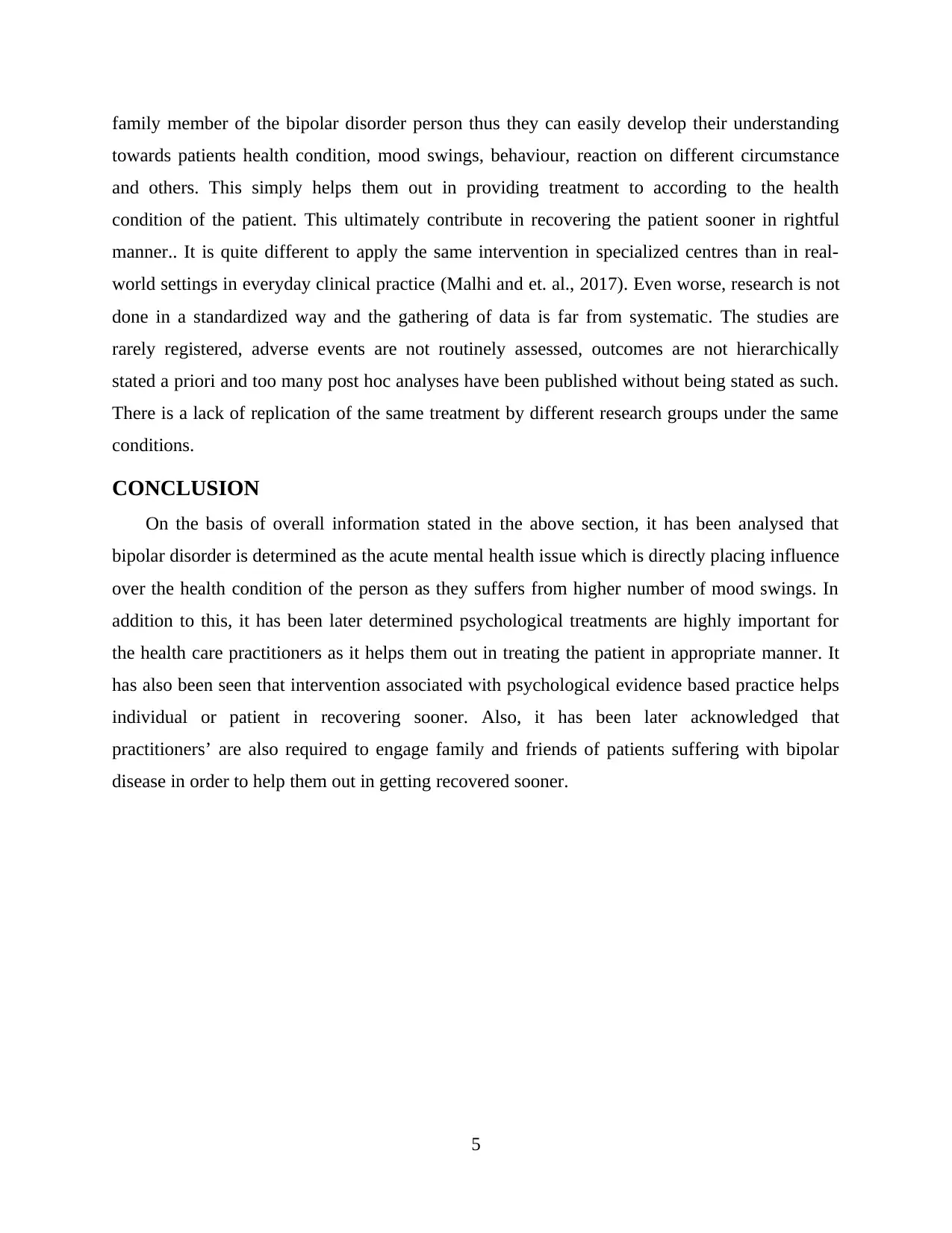
family member of the bipolar disorder person thus they can easily develop their understanding
towards patients health condition, mood swings, behaviour, reaction on different circumstance
and others. This simply helps them out in providing treatment to according to the health
condition of the patient. This ultimately contribute in recovering the patient sooner in rightful
manner.. It is quite different to apply the same intervention in specialized centres than in real-
world settings in everyday clinical practice (Malhi and et. al., 2017). Even worse, research is not
done in a standardized way and the gathering of data is far from systematic. The studies are
rarely registered, adverse events are not routinely assessed, outcomes are not hierarchically
stated a priori and too many post hoc analyses have been published without being stated as such.
There is a lack of replication of the same treatment by different research groups under the same
conditions.
CONCLUSION
On the basis of overall information stated in the above section, it has been analysed that
bipolar disorder is determined as the acute mental health issue which is directly placing influence
over the health condition of the person as they suffers from higher number of mood swings. In
addition to this, it has been later determined psychological treatments are highly important for
the health care practitioners as it helps them out in treating the patient in appropriate manner. It
has also been seen that intervention associated with psychological evidence based practice helps
individual or patient in recovering sooner. Also, it has been later acknowledged that
practitioners’ are also required to engage family and friends of patients suffering with bipolar
disease in order to help them out in getting recovered sooner.
5
towards patients health condition, mood swings, behaviour, reaction on different circumstance
and others. This simply helps them out in providing treatment to according to the health
condition of the patient. This ultimately contribute in recovering the patient sooner in rightful
manner.. It is quite different to apply the same intervention in specialized centres than in real-
world settings in everyday clinical practice (Malhi and et. al., 2017). Even worse, research is not
done in a standardized way and the gathering of data is far from systematic. The studies are
rarely registered, adverse events are not routinely assessed, outcomes are not hierarchically
stated a priori and too many post hoc analyses have been published without being stated as such.
There is a lack of replication of the same treatment by different research groups under the same
conditions.
CONCLUSION
On the basis of overall information stated in the above section, it has been analysed that
bipolar disorder is determined as the acute mental health issue which is directly placing influence
over the health condition of the person as they suffers from higher number of mood swings. In
addition to this, it has been later determined psychological treatments are highly important for
the health care practitioners as it helps them out in treating the patient in appropriate manner. It
has also been seen that intervention associated with psychological evidence based practice helps
individual or patient in recovering sooner. Also, it has been later acknowledged that
practitioners’ are also required to engage family and friends of patients suffering with bipolar
disease in order to help them out in getting recovered sooner.
5
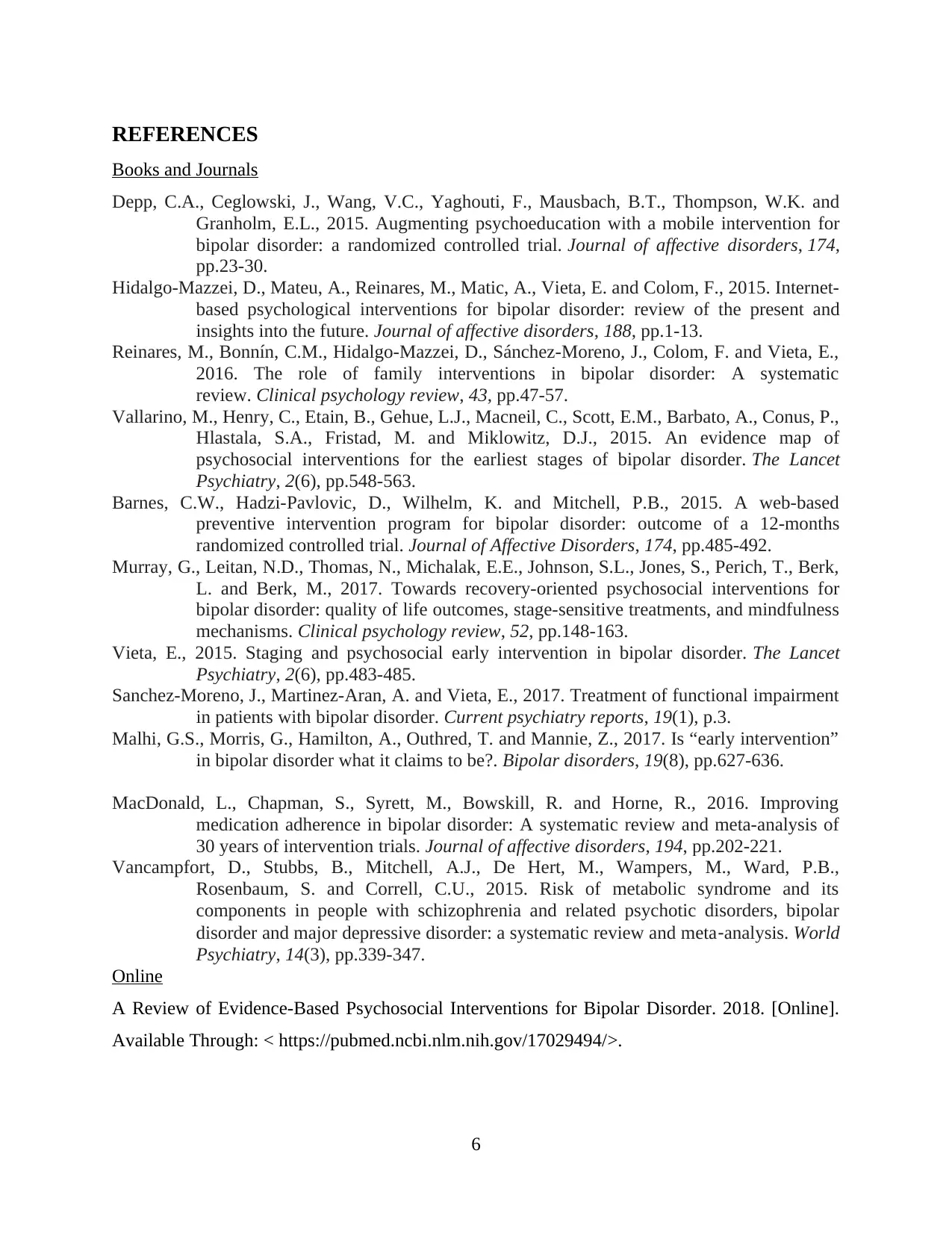
REFERENCES
Books and Journals
Depp, C.A., Ceglowski, J., Wang, V.C., Yaghouti, F., Mausbach, B.T., Thompson, W.K. and
Granholm, E.L., 2015. Augmenting psychoeducation with a mobile intervention for
bipolar disorder: a randomized controlled trial. Journal of affective disorders, 174,
pp.23-30.
Hidalgo-Mazzei, D., Mateu, A., Reinares, M., Matic, A., Vieta, E. and Colom, F., 2015. Internet-
based psychological interventions for bipolar disorder: review of the present and
insights into the future. Journal of affective disorders, 188, pp.1-13.
Reinares, M., Bonnín, C.M., Hidalgo-Mazzei, D., Sánchez-Moreno, J., Colom, F. and Vieta, E.,
2016. The role of family interventions in bipolar disorder: A systematic
review. Clinical psychology review, 43, pp.47-57.
Vallarino, M., Henry, C., Etain, B., Gehue, L.J., Macneil, C., Scott, E.M., Barbato, A., Conus, P.,
Hlastala, S.A., Fristad, M. and Miklowitz, D.J., 2015. An evidence map of
psychosocial interventions for the earliest stages of bipolar disorder. The Lancet
Psychiatry, 2(6), pp.548-563.
Barnes, C.W., Hadzi-Pavlovic, D., Wilhelm, K. and Mitchell, P.B., 2015. A web-based
preventive intervention program for bipolar disorder: outcome of a 12-months
randomized controlled trial. Journal of Affective Disorders, 174, pp.485-492.
Murray, G., Leitan, N.D., Thomas, N., Michalak, E.E., Johnson, S.L., Jones, S., Perich, T., Berk,
L. and Berk, M., 2017. Towards recovery-oriented psychosocial interventions for
bipolar disorder: quality of life outcomes, stage-sensitive treatments, and mindfulness
mechanisms. Clinical psychology review, 52, pp.148-163.
Vieta, E., 2015. Staging and psychosocial early intervention in bipolar disorder. The Lancet
Psychiatry, 2(6), pp.483-485.
Sanchez-Moreno, J., Martinez-Aran, A. and Vieta, E., 2017. Treatment of functional impairment
in patients with bipolar disorder. Current psychiatry reports, 19(1), p.3.
Malhi, G.S., Morris, G., Hamilton, A., Outhred, T. and Mannie, Z., 2017. Is “early intervention”
in bipolar disorder what it claims to be?. Bipolar disorders, 19(8), pp.627-636.
MacDonald, L., Chapman, S., Syrett, M., Bowskill, R. and Horne, R., 2016. Improving
medication adherence in bipolar disorder: A systematic review and meta-analysis of
30 years of intervention trials. Journal of affective disorders, 194, pp.202-221.
Vancampfort, D., Stubbs, B., Mitchell, A.J., De Hert, M., Wampers, M., Ward, P.B.,
Rosenbaum, S. and Correll, C.U., 2015. Risk of metabolic syndrome and its
components in people with schizophrenia and related psychotic disorders, bipolar
disorder and major depressive disorder: a systematic review and meta‐analysis. World
Psychiatry, 14(3), pp.339-347.
Online
A Review of Evidence-Based Psychosocial Interventions for Bipolar Disorder. 2018. [Online].
Available Through: < https://pubmed.ncbi.nlm.nih.gov/17029494/>.
6
Books and Journals
Depp, C.A., Ceglowski, J., Wang, V.C., Yaghouti, F., Mausbach, B.T., Thompson, W.K. and
Granholm, E.L., 2015. Augmenting psychoeducation with a mobile intervention for
bipolar disorder: a randomized controlled trial. Journal of affective disorders, 174,
pp.23-30.
Hidalgo-Mazzei, D., Mateu, A., Reinares, M., Matic, A., Vieta, E. and Colom, F., 2015. Internet-
based psychological interventions for bipolar disorder: review of the present and
insights into the future. Journal of affective disorders, 188, pp.1-13.
Reinares, M., Bonnín, C.M., Hidalgo-Mazzei, D., Sánchez-Moreno, J., Colom, F. and Vieta, E.,
2016. The role of family interventions in bipolar disorder: A systematic
review. Clinical psychology review, 43, pp.47-57.
Vallarino, M., Henry, C., Etain, B., Gehue, L.J., Macneil, C., Scott, E.M., Barbato, A., Conus, P.,
Hlastala, S.A., Fristad, M. and Miklowitz, D.J., 2015. An evidence map of
psychosocial interventions for the earliest stages of bipolar disorder. The Lancet
Psychiatry, 2(6), pp.548-563.
Barnes, C.W., Hadzi-Pavlovic, D., Wilhelm, K. and Mitchell, P.B., 2015. A web-based
preventive intervention program for bipolar disorder: outcome of a 12-months
randomized controlled trial. Journal of Affective Disorders, 174, pp.485-492.
Murray, G., Leitan, N.D., Thomas, N., Michalak, E.E., Johnson, S.L., Jones, S., Perich, T., Berk,
L. and Berk, M., 2017. Towards recovery-oriented psychosocial interventions for
bipolar disorder: quality of life outcomes, stage-sensitive treatments, and mindfulness
mechanisms. Clinical psychology review, 52, pp.148-163.
Vieta, E., 2015. Staging and psychosocial early intervention in bipolar disorder. The Lancet
Psychiatry, 2(6), pp.483-485.
Sanchez-Moreno, J., Martinez-Aran, A. and Vieta, E., 2017. Treatment of functional impairment
in patients with bipolar disorder. Current psychiatry reports, 19(1), p.3.
Malhi, G.S., Morris, G., Hamilton, A., Outhred, T. and Mannie, Z., 2017. Is “early intervention”
in bipolar disorder what it claims to be?. Bipolar disorders, 19(8), pp.627-636.
MacDonald, L., Chapman, S., Syrett, M., Bowskill, R. and Horne, R., 2016. Improving
medication adherence in bipolar disorder: A systematic review and meta-analysis of
30 years of intervention trials. Journal of affective disorders, 194, pp.202-221.
Vancampfort, D., Stubbs, B., Mitchell, A.J., De Hert, M., Wampers, M., Ward, P.B.,
Rosenbaum, S. and Correll, C.U., 2015. Risk of metabolic syndrome and its
components in people with schizophrenia and related psychotic disorders, bipolar
disorder and major depressive disorder: a systematic review and meta‐analysis. World
Psychiatry, 14(3), pp.339-347.
Online
A Review of Evidence-Based Psychosocial Interventions for Bipolar Disorder. 2018. [Online].
Available Through: < https://pubmed.ncbi.nlm.nih.gov/17029494/>.
6
⊘ This is a preview!⊘
Do you want full access?
Subscribe today to unlock all pages.

Trusted by 1+ million students worldwide

7
1 out of 10
Related Documents
Your All-in-One AI-Powered Toolkit for Academic Success.
+13062052269
info@desklib.com
Available 24*7 on WhatsApp / Email
![[object Object]](/_next/static/media/star-bottom.7253800d.svg)
Unlock your academic potential
Copyright © 2020–2026 A2Z Services. All Rights Reserved. Developed and managed by ZUCOL.





